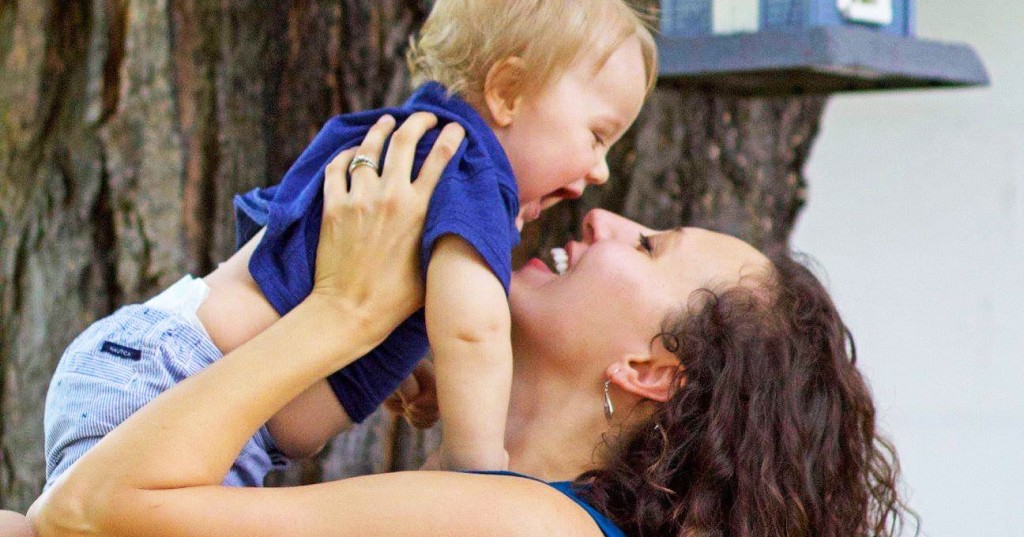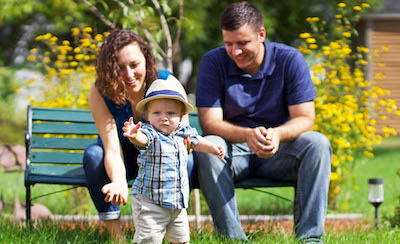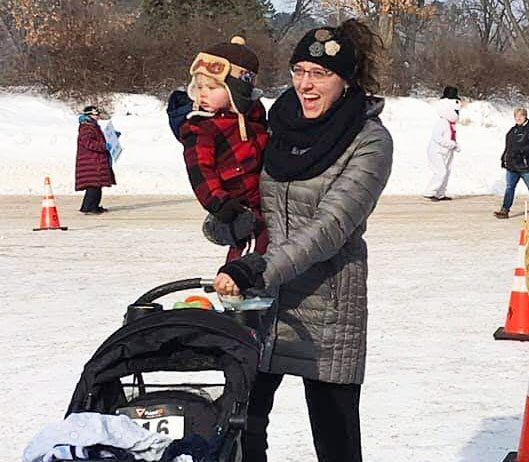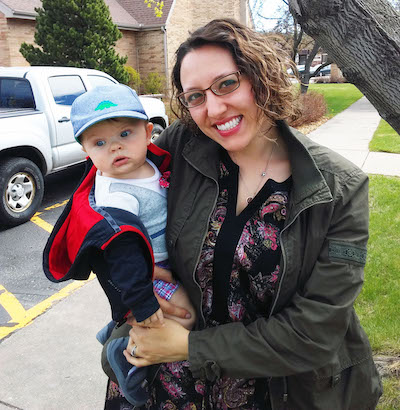New mother Dayna Hodgins gets care she needs at UPHS
February 13, 2020

Depression and anxiety have always been a part of Dayna Hodgins’ life, and those feelings managed to persist during her first pregnancy. Still, she held out hope it was just a part of the prenatal process — something typical for first-time mothers. To cope, she told herself the sad thoughts would eventually be replaced with the joy of giving birth to her son. And for two weeks, she was uplifted with the happiness one would expect. The depression dissipated.
But being a new mother created another avenue for anxiety to play into Dayna’s mind. After the initial euphoria of a having a child began to wear off, she grew distressed over even the most routine tasks concerning her son, including just picking him up. She was afraid of dropping her child, and the anxiety coursed throughout her body, making her arms and legs tingle when she reached for him. Still, she put on a happy face for everyone to see, to ward off any indications she was an unhappy new mother, just so others wouldn’t make the wrong correlation that her feeling upset would somehow be related to being a careless first-time mom.
Then, the panic attacks started.
“I wouldn’t wish that on anyone. I felt like I was going to die,” Dayna said of her debilitating anxiety. “I needed help. By the fourth week, I couldn’t sleep and couldn’t eat.”
Dayna discovered that finding help for struggling new mothers wasn’t readily available to her in Iron Mountain. Her mom was thrown for a loop trying to find assistance for Dayna. When she called an obstetrician-gynecologist, she was advised to reach out to her family medicine provider or her OB.
“It seemed like there was such a disconnect from prenatal and post-care,” Dayna said. “It didn’t seem like there was a clear system for moms, and I didn’t know what to do.”
Following a roundabout of calls across various local health centers, Dayna’s mother finally received a worthy tip: the inpatient behavioral health unit at UPHS – Marquette.

Despite her stress and panic attacks, Dayna still felt reservations about visiting UPHS. Her anxiety played into her mind, wondering if she would be considered a “crazy person” by anyone she would tell her fears to. Her previous unhelpful encounters with a family doctor didn’t assuage any of those concerns.
But it took just moments for Dayna to realize UPHS was different. It started with meeting members of the nursing staff, who relayed stories of struggle from their motherhood to help Dayna understand she wasn’t alone. Then, her social worker — another mom — communicated her own experiences of being a mother to give Dayna an immediate comfort level she previously didn’t receive in other health care environments.
“I was treated like a human being and an equal,” Dayna said. “They took my care seriously, and I felt like I was being listened to.
“Just hearing I’m not going crazy, that this is more common than it’s portrayed, and it’ll be OK. They set me up with a plan.”
Educating Dayna that she was not alone in this struggle was one of UPHS’ priorities. She was given a folder filled with information, including websites and phone numbers to call if she felt down; she was also taught exercises for when she feels anxious and advised on how to quell irrational thoughts that would make their way into her head. The effectiveness of those tools has propelled Dayna to share those same exercises and tips with others who are enduring a similar experience as herself. She started a monthly get together for new moms, and has delivered the tips to those seeking help themselves.

“I left UPHS with an overwhelming amount of health and education, and that is exactly what I needed,” Dayna said. “I still go back to those educational packets and refer to them.
“I feel like with my experience and what they gave me, I’ve been able to give to other moms and help them.”
Dayna’s inpatient stay lasted five days. In a place of comfort and care, she was able to routinely get a decent night’s sleep and found herself enjoying the meals as well. She mingled with other patients, exchanging stories about life and hardship, with each of them sharing a similar sentiment: They just needed a break from life.
Mornings consisted of taking medication and eating breakfast with the other patients to combat the loneliness from being away from her son. Nail polish, makeup, and other amenities were readily available for her to prepare for the day, and early on, it was some of the first moments Dayna could remember getting ready since having the baby.
“Just going there, brushing my hair and taking care of my nails was a refreshing thing to do,” Dayna said. “I didn’t have time to do stuff like that before.”
The staff would have activities throughout the day, including gym time and arts and crafts; one of Dayna’s creations was a tote bag for her kid.
Check-in meetings were routine, with the focus around patient goals and what they want to accomplish during the stay and when going home. In the evenings, education meetings centered around mental health and the steps you can take to improve your own, such as reflecting on your diet. A game with the group before a final dose of medication marked the end of the day.

“They kept you busy, which I think was huge,” Dayna said. “They didn’t let you sit in your thoughts, so the days would go by quick.”
Dayna stayed at UPHS for a week. She was finally given a proper course of action to combat her constant worrying with information and mental exercises. It was also here where she got the proper medication she needed, which wasn’t the case during visits at other health centers.
With depression weighing on her, Dayna was told medication for her mental health would not be possible if she wanted to keep nursing her son. She felt defeated. She already felt bad enough with her anxious thoughts, and now was being told proper medicine wasn’t an option for her if she wanted to feed her child. Dayna was heartbroken.
At UPHS, Dayna had a meeting with a lactation consultant and pharmacist to discover ways to get her the help she needed, while still being able to provide for her son. They concluded that Zoloft would be best for her, given how there’s a minute amount of the anxiety medicine that goes into a woman’s breastmilk.
“I was worried that the medication would be invasive to breast milk or addictive, but they gave me the education to feel safe about taking them,” Dayna said. “UPHS helped me stamp out that stigma about taking medication for mental health. I didn’t feel weak or like a failure. Your medication is helping your body work as it should. Now, I’m an advocate for medication for mental health. I’m on it. No shame for it.”

After leaving the inpatient unit, Dayna was set up with a counselor who she met with weekly early on. Eventually, those meetings tapered to become monthly and are now needed just every couple of months. Soon, Dayna began seeing the results of her stay and newfound education in her daily life. In two months, her panic attacks started to go away. Following six months, she noticed a marked improvement in her mood and health. And a year after her son was born, she finally felt like herself again.
“When I left UPHS, I felt so much better because I had four or five nights of solid sleep, but I also felt so much better knowing that there was a plan for me,” she said. “What I was going through was common. That I was going to get better. That helped me get through the days after the inpatient unit.”
Dayna’s transformation through postpartum depression has her contemplating a life option she never once considered before: having another kid. Yes, the woman who battled through a debilitating depression to return to her normal life is willing to give childbirth another go. On the surface, it may seem surprising, but considering how Dayna is now educated and has the proper support system to go through the experience this time around, it begins to make sense.
“At first it was absolutely not,” she said of contemplating having another child. “Now my counselor has been supportive of my decision either way. They’re comforting and I know that they’ll be there for me.
“Now it’s not off the table. I think we’ll have another child. My son is starting to sleep now, so I will look to enjoy that.”
Not only did Dayna leave UPHS with a rejuvenated sense of life, but she also came away inspired by the work those do at UPHS. She’s currently pursuing a Master’s Social Work Program from Indiana Wesleyan University through online classes. Her goal is to make a positive difference in lives the same way hers was impacted at UPHS.
“The social workers at UPHS were instrumental in my recovery,” she said. “I feel so strongly that what I went through, I went through for a reason. Hopefully, I can be a social worker and help other moms.
“The stigma needs to be stamped out of moms feeling that they can’t ask for help. It’s just so important. That’s my newfound mission. Now that I’m fully recovered, I just want to bring awareness for it and help other moms.”
For more information about UPHS – Marquette Inpatient Behavioral Health, please call 449.3740 or click here to visit our website.
